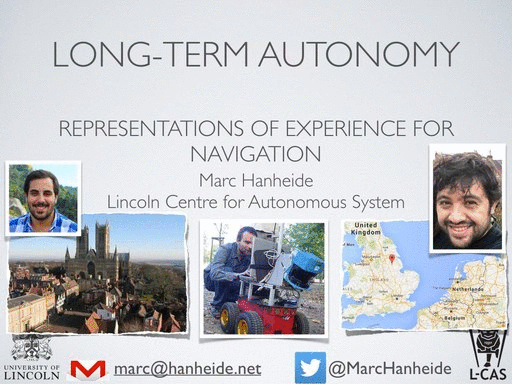
Have a say on your postgraduate experience at the University of Lincoln and make a change to research culture through the national Postgraduate Research Experience Survey 2019
Login with your Student ID and password pres2019: http://lncn.ac/pres2019

I’ll have the pleasure being part of a panel shining some light on the relation between Mary Shelley’s Frankenstein and advances in robotics research. This is part of a special event, hosted by the “Venue”, at Bishop Grosseteste University’s Lincoln Ca…

The European Robotics Forum is over (okay, already for almost two weeks), but due to some requests I’m going to share my slides presented in the last session “Case studies and future needs of long-term navigation and reasoning“. This was mostly about work done in the FP7 STRANDS project by my colleagues Tomás Krajník and Jaime Pulido Fentanes (credit where credit is due!). So, here the slides of the presentation “Long-term Autonomy – Representations of Experience for Navigation“:

A few very good news came in recently. Our papers submitted to SAC 2017 and HRI 2017 have been accepted.
The first one to be presented at SAC 2017 is joint work with my PhD student Peter Lightbody and Dr Tomas Krajnik on
“A Versatile High-Performance Visual Fiducial Marker Detection System with Scalable Identity Encoding”.
Fiducial markers have a wide eld of applications in robotics, ranging from external localisation of single robots or robotic swarms, over self-localisation in marker-augmented environments, to simplifying perception by tagging objects in a robot’s surrounding. We propose a new family of circular markers allowing for a computationally e cient detection, identi cation and full 3D position estimation. A key concept of our system is the separation of the detection and identi cation steps, where the rst step is based on a computationally e cient circular marker detection, and the identification step is based on an open-ended `necklace code’, which allows for a theoretically in nite number of individually identi able markers. The experimental evaluation of the system on a real robot indicates that while the proposed algorithm achieves similar accuracy to other state-of-the-art methods, it is faster by two orders of magnitude and it can detect markers from longer distances.
The second paper has been accepted at HRI 2017, which has an acceptance rate of only 24%, co-authored by Marc Hanheide, Denise Hebesberger, and Tomas Krajnik:
“The When, Where, and How: An Adaptive Robotic Info-Terminal for Care Home Residents – A long-term Study”
Adapting to users’ intentions is a key requirement for autonomous robots in general, and in care settings in particular. In this paper, a comprehensive long-term study of a mobile robot providing information services to residents, visitors, and staff of a care home is presented with a focus on adapting to the when and where the robot should be offering its services to best accommodate the users’ needs. Rather than providing a fixed schedule, the presented system takes the opportunity of long-term deployment to explore the space of possibilities of interaction while concurrently exploiting the model learned to provide better services. But in order to provide effective services to users in a care home, not only then when and where are relevant, but also the way how the information is provided and accessed. Hence, also the usability of the deployed system is studied specifically, in order to provide a most comprehensive overall assessment of a robotic info-terminal implementation in a care setting. Our results back our hypotheses, (i) that learning a spatiotemporal model of users’ intentions improves efficiency and usefulness of the system, and (ii) that the specific information sought after is indeed dependent on the location the info-terminal is offered.

Marc Hanheide will be presenting his research at two invited workshop presentations at IROS 2016. Marc will be speaking in the”Workshop on Shared Autonomy”, presenting work on “Adaptive Long-Term Autonomy – Empowering end-users of Autonomous Systems” (…
